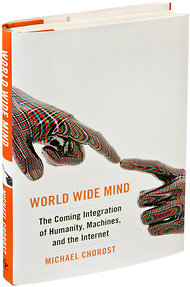Serendip is an independent site partnering with faculty at multiple colleges and universities around the world. Happy exploring!

Dennett's Dangerous Idea
In last week’s webpaper, I wrote about the exciting and progressive possibilities that evolution presents for education, and the ways in which people like Paulo Freire already seem to embody some of these ideas. User hlehman wrote about the idea of evolutionary education too, asserting that:
“Evolution is about change and questions, an ongoing process and story to explain why things happen. It is important for children to have a positive exposure to the story of evolution because it allows them to open their minds and see what science does for us. Science provokes people to think in a new way without limitations or rules.”

Information Overload
My title pretty much expresses how I feel about the subject: there is way too much for me to process right now.

Mindfulness
Not to jump the gun, but my post this week is intertwined with the book that I'd like to suggest we read, in whole or in part, during the last week of class. I was browsing the New York Times online when I stumbled across a review of a new "book on science" that could not possibly be more relevant to this class.
Cultural Memes and The Human Selector
Daniel Dennett's discussion of the "meme" as a cultural equivalent to the "gene" is supposed to be geared towards applying the theory of evolution to other concepts, such as the development of culture. But the problem I see in this model is the conflict between the inherent idea of randomness in evolution, and what seems to me to be an inherent element of design in culture and in cultural memes.

Generational Multi-tasking Aptitude
Ahhh, where to begin?! This week’s transition from focusing on gender to information was a very demanding one for me. Thinking about binaries, gender identity and their relationship with technology feels more natural to me compared to making abstract philosophical debates regarding the processing of information. Both class and the Rowe, Grobstein and Hayles readings have given me a headache. (in a good way)
Weekly posting (due 02.18): How humans acquire information changes as the forms of information change
Before talking about other forms of information, it is important to notice that daily conversations have been the most prominent form of information throughout the history. Secondary forms, other than communication between humans, have changed significantly over time. Before the development of computer technology, primary form of information was presented as a form of writing. Art and music definitely existed and some people might claim that they were forms of information as well, but the abstract definition of information makes it hard to judge if they count as forms of information. It is still not doubtable that writing was the most prominent form. After the development and wide spread of computer technology, most of the forms of information are acquired thru computer.

Complication Made Easy!
“Problems in science are sometimes made easier by adding complications.” (Dennett, p.38)




